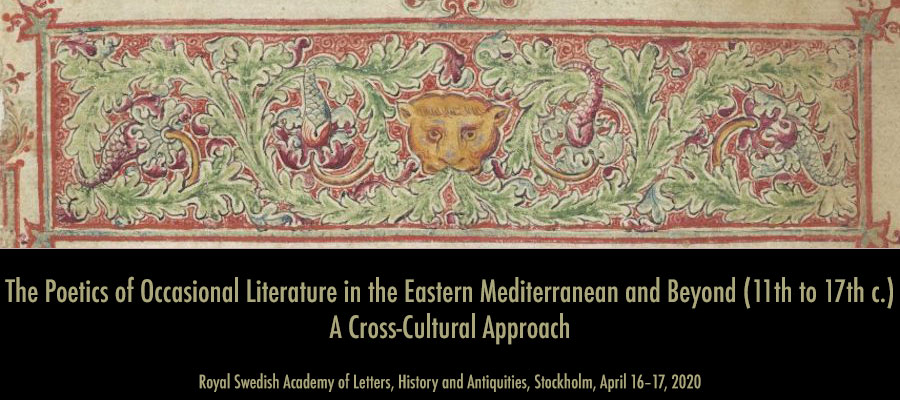The Poetics of Occasional Literature in the Eastern Mediterranean and Beyond (11th to 17th c.): A Cross-Cultural Approach, Royal Swedish Academy of Letters, History and Antiquities, Stockholm, April 16–17, 2020
Writing on command and for specific occasions is a key characteristic of medieval literature across various cultures. Textual genesis was often triggered by the sponsorship of a patron. Patronage thus gave rise to a wide range of texts, such as court poetry, orations, long narratives or didactic works, and this resulted in dynamic and multi-layered ties between authors and patrons. Commissioned texts could function as self-promotion of both commissioner and author. Such extratextual aims shaped not only the content, form and language of medieval literature, but also its aesthetics and functions. Although literary patronage and social networks have attracted increasing interest in recent years, there has been no systematic attempt to study occasional literature in a cross-cultural perspective.
With this experimental workshop we wish to bring together scholars who are interested in the poetics of literary patronage. We will focus on the cultures of the eastern Mediterranean and beyond within a wide timespan, from the 11th to the 17th centuries, including texts written in Greek, Latin, Ottoman Turkish, Persian, Arabic, Slavonic, Georgian, Armenian, Romance and Germanic languages in all their language registers.
Questions and topics that might be addressed include:
- What are the characteristics that occasional texts share across the literary traditions of the eastern Mediterranean? What features set them apart from texts not associated with a request? Is there any clear boundary between literature on command and texts that do not depend on any system of literary patronage?
- How does the poetics of occasional texts transform across various genres and different social settings of production, such as the court, literary salons or ecclesiastical environments? What kind of implications can we note for the techniques of an author working over a long period in the service of a patron?
- Are there turning points, if any, for the role and status of patronage in the literary cultures of the medieval Mediterranean? What was the impact of patronage on the prose and verse production of a literary tradition at any given moment?
- How can we shape a theoretical model about literature on command that could describe the specific circumstances of production of these texts and help us acquire a more nuanced understanding of them?
